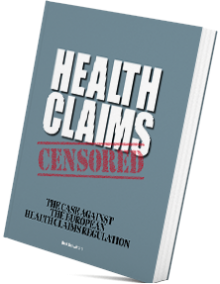The European Nutrition and Health Claims Regulation (NHCR) is a “legal instrument” that deprives European as well as extra-European “food business operators” of their fundamental freedom to share with European consumers information concerning the nutritional and health benefits of their products. In European food law, “food business operators” are not defined as persons who are engaged in the specific activities involving the production or procurement of food. No, the European legislature defined them as “the natural or legal persons responsible for ensuring that the requirements of food law are met within the food business under their control.” [i] So, in Europe, the “operations” of business operators are framed as activities aimed at ensuring that “food business” is performed in accordance with food law.
It’s like defining a pedestrian as a natural person responsible for ensuring that the legal requirements for travelling on foot are being met.
The definition is the result of the worldview that requirements designed by legislators, in lieu of those developed and applied in actual practice by skilled and experienced operators, will produce politically correct foods. Food business operators may run their businesses, on condition that they apply the requirements laid down in food law. In the European Union, these requirements are laid down in numerous Regulations and Directives that now cover practically each and every detail of the production and marketing of food products.
To the exclusion of the operators, the business regulators “own” the rules and criteria set for the entire operation, while, in name only, the operators still “own” what is left of the business. The investments that must be made to establish the business, the financial risks involved in operating the business and the risk of going out of business because of the requirements set by the legislators, are left to the operators. Contrary to what the definition of “food business operator” suggests, the business is no longer under the operator’s control. It is now controlled by the legislators who turned the operators into their proxies.
The regulators, few to none of whom have ever set foot in a food business, fabricate the rules on the basis of their idiosyncratic political and ideological preferences. When they need scientific advice, that advice shall be provided by scientists who are carefully selected by the EU’s Scientific Authorities to the exclusion of all scientists who have or had a relationship with the business operators. The regulators are thus in full control of our food supply. The operators must just make sure that the requirements laid down in food law are being met. In case something goes wrong, the operator in question always takes the bullet since he is “guilty by definition.” After all, that definition is formulated as the legal/judicial responsibility to ensure that the requirements laid down in the various food laws shall be met. The regulators themselves never have to admit any wrongdoing. When outcomes are not to their satisfaction, they simply amend the existing requirements or add new ones.
The NHCR is such a new requirement that was added to European food law. All health claims made in the operators’ communications must now be “owned” and authorized by the legislators. For this purpose, health claims were given the status of public property. In the act of taking “public” control of health claims, the legislators also arrogated the operators’ fundamental freedom of expression, as if that freedom were a right that exclusively belongs to the legislators. Something that they can give or take back at will, depending on the operators’ preparedness to accept responsibility for ensuring that the legislators’ requirements are being met. In the case of the NHCR, the right was denied even to food business operators who were correctly and truthfully informing consumers about the benefits of their products. Combining the NHCR’s requirements and the legal definition of “food business operator,” the operators were taken prisoner by the legislators.
On the 3rd of October 2012, the Parliamentary Assemblee of the Council of Europe reaffirmed that a person deprived of his or her personal liberty is to be regarded as a “political prisoner” if …
“… the detention has been imposed in violation of one of the fundamental guarantees set out in the European Convention on Human Rights and its Protocols (ECHR), in particular freedom of thought, conscience and religion, freedom of expression and information, freedom of assembly and association;
… the detention has been imposed for purely political reasons without connection to any offence;
… for political motives, the length of the detention or its conditions are clearly out of proportion to the offence the person has been found guilty of or is suspected of;
… for political motives, he or she is detained in a discriminatory manner as compared to other persons;
.. the detention is the result of proceedings which were clearly unfair and this appears to be connected with political motives of the authorities.” [ii]
Even though they are not being physically “detained,” each of the criteria applies to food business operators. The “detention” laid down in the NHCR is the absolute and irrevocable prohibition to communicate unauthorized though truthful health information. It was imposed in violation of the freedom of expression and information, set out in the Convention. Because the “detention” also applies to truthful and relevant health information, it was clearly imposed for purely political reasons, without any connection to a specific offence. The length of the “detention” is evidently out of proportion. As part of European food law, the “detention” will be indefinite unless the NHCR would be completely repealed. The “detention” is discriminatory, since it exclusively applies to the group of natural and legal persons defined as “food business operators.” The “detention” is clearly the result of unfair proceedings connected to the political motives of the legislators. In fact, there never were any “proceedings,” because there was no specific offence attributed to any individual operator.
Food business operators who are under the impression that they can end this “detention” by applying for the authorization of a health claim, will soon find out that they cannot end it by applying for a claim. When the applicant prepares and sends in an application, he merely performs a service to the legislators, who are being spared the trouble of themselves having to prepare the substantiation of the claim that, if they care to authorize it, will eventually become their “public” property. Like all his fellow-operators, the applicant-operator remains indefinitely detained as an “incommunicado.” He will never be the “owner” and source of the claim he applied for. If the claim becomes authorized and the applicant uses it, he will do no more than relaying a public statement registered as permissible by the European legislature.
In the European Union, the food business has become a prison. Operators who want to escape from this prison can only do so by quitting the food business. If all food business operators would do so, the Union would soon starve to death.
Bert Schwitters




